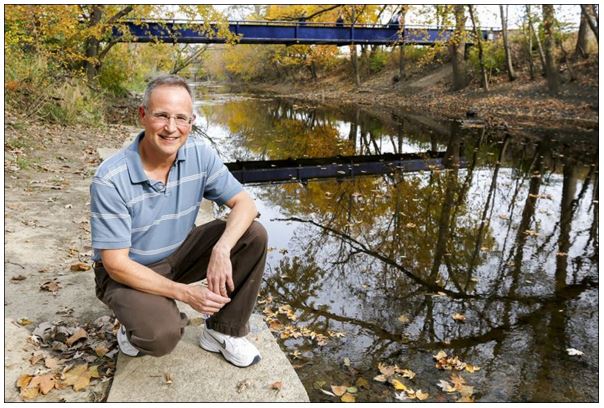NASA grant to assist UT curriculum
Geography professor to lead $10 million STEM initiative
By Nolan Rosenkrans, Blade Staff Writer
Oct. 27th, 2015
Dr. Kevin Czajkowski
Resource: UT News
Resource: 13 abc News
A University of Toledo professor will try to improve science education through a grant
from NASA.
The university will announce today that geography professor Kevin Czajkowski will take the lead on a $10 million initiative to develop a project-based curriculum in STEM — science, technology, engineering, and mathematics. The goal is to make learning in those subjects more hands-on for students, immersing them in projects to solve problems through science, with the aid of NASA data.
“Education research shows that when students do projects, they learn better than by reading a book or doing a work sheet or something,” Mr. Czajkowski said.
The UT team — which includes Glenn Lipscomb, professor and chair of the department of chemical and environmental engineering, and Mark Templin, associate professor in the department of curriculum and instruction — is one of 27 to receive a NASA grant. The agency awarded $42 million to the teams, and the Toledo-led one is among a handful to be fully funded.
“STEM education is the enabler of future space exploration and these awards, together with efforts in NASA’s Office of Education and other partners, will advance STEM efforts in this country, improve U.S. scientific literacy, and help to inspire our nation,” John Grunsfeld, astronaut and associate administrator of NASA’s Science Mission Directorate, said in a statement.
The idea is to base classes around problem solving. Mr. Czajkowski used a project he did in the Dominican Republic as an example. The students studied how a newly paved playground area was hotter than grassy areas. The students used an infrared thermometer to measure heat differences, and decided that painting the pavement green would reduce a significant amount of heat absorption.
The UT team is working with Boston University, Tennessee State University, the University of California-Berkeley, the San Francisco research and service agency WestEd, technology company Raytheon, and NASA’s Langley Research Center.
The research center will help provide the program with satellite data so that students can use the agency’s information to validate their work. NASA’s involvement is a significant engagement piece, Mr. Czajkowski said.
“Students get excited [when you mention NASA],” he said.
As project lead, UT will receive about $8 million, but will only spend about $2 million locally. The rest will be funneled to the partner groups.
The NASA center received about $2 million in funding that was contingent on the Toledo team receiving the grant, bringing the project total to about $10 million, Mr. Czajkowski said.
Students in Monroe and Findlay will work with Mr. Czajkowski’s team, and the partner institutions will pilot the program with students in their regions as well.
The grant will help pay the salaries of Mr. Czajkowski’s team, along with a project manager, education specialist, and a graduate student, as well as stipends for K-12 teachers to do summer workshops. The grant is for five years, with the possibility of another five-year grant when the current one ends.
Contact Nolan Rosenkrans at: nrosenkrans@theblade.com or 419-724-6086, or on Twitter @NolanRosenkrans.



